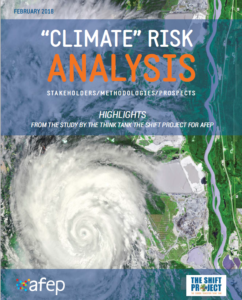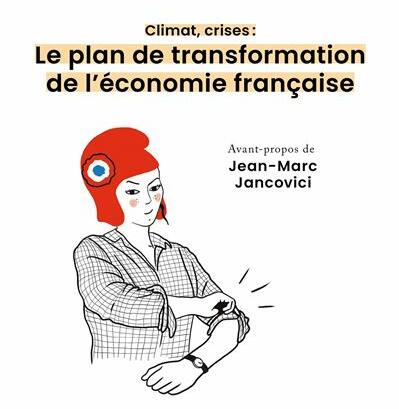An inevitable risk, a proliferation of analysis methodologies
 The “climate” risk is an urgent, global, systemic and irreversible one which is closely linked to fossil fuel use, a key driver of economic development. It can be broken down into the “physical risk” (the increasing number of extreme natural events), and the “transition risk” (relating to the constraints imposed on economic and political stakeholders to restrict greenhouse gas emissions).
The “climate” risk is an urgent, global, systemic and irreversible one which is closely linked to fossil fuel use, a key driver of economic development. It can be broken down into the “physical risk” (the increasing number of extreme natural events), and the “transition risk” (relating to the constraints imposed on economic and political stakeholders to restrict greenhouse gas emissions).
Momentum around the climate issue has grown significantly since the signing of the Paris Agreement in December 2015. For instance, financial players are exerting constant pressure on companies to prepare for the climate risk and develop their strategies and reporting mechanisms.
This has resulted in a proliferation of climate risk analysis methods and the emergence of new corporate measurement standards – standards which up to now have been broadly based on financial indicators alone.
Companies are increasingly questioning the maturity, relevance, complexity and heterogeneity of such analysis methods.
Aim and method of the study
The French Association of Large Companies (AFEP, Association française des entreprises privées) asked the think tank The Shift Project to conduct an analysis of stakeholders in climate risk assessment, their choice of methodologies and key market trends. The aim was to help companies to more clearly understand the environment in which they were developing in terms of climate risk analysis.
The Shift Project team conducted:
- interviews with AFEP companies to clarify their questions about stakeholders in climate risk assessment and their methodologies, and to establish consensus with them;
- based on that consensus, exchange forums with the majority of stakeholders in climate risk analysis: financial and non-financial ratings agencies, carbon data providers, index providers;
- interviews with public stakeholders and national and international organizations (the French Treasury Department, the Task Force on Climate-related Financial Disclosures (TCFD), the High-Level Expert Group on Sustainable Finance (HLEG) and the French Financial Markets Authority (AMF) among others) to shed light on trends in the national and international regulatory environments.
Key learnings
- Traditionally considered within the broader framework of environmental, social and governance (ESG) analysis, the climate component is increasingly being singled out in the work of risk analysis and ratings officers. It is expected to continue being singularised in this way owing to its fundamentally systemic, irreversible, global and very-long term dimension.
- Despite marked progress, the scope of the “climate rating” remains limited. The climate risk is only slowly and partially being integrated into the mainstream analyses and studies of major financial ratings agencies. The utilisation of analyses conducted by non-financial ratings agencies focuses on assets for which there is specific demand from a small minority of end-investors (green bonds, SRI funds, “low carbon” indices).
- The climate rating sector, like the ESG sector as a whole, lacks resources, resulting in (i) slower integration of the systemic risks related to climate change; (ii) less R&D in that field; (iii) the promotion of oversimplified or automated analysis; (iv) potential governance problems that damage confidence among stakeholders.
- Analysing the risks and opportunities related to “low carbon” strategies depends on the development of expertise and the mobilisation of resources, which are currently inadequate. In addition to evaluating direct or indirect greenhouse gas emissions, analysis methodologies must increasingly take into account how dynamic and forward-looking deployed strategies are.
- There is a temptation to implement oversimplified methodologies for the assessment of investment portfolios in the financial sector. The use of such static, reductive and methodologically fragile analyses should constitute only a single step in the actual integration of the climate risk by markets.
While the climate issue is bound to become ever more central, in France remarkable consensus is emerging in political and economic spheres on the gravity of the matter, which could give rise to a long-term national ambition. In addition to largely decarbonised power generation and proactive legislation, France has a number of assets to help it overcome the climate challenge and become a leader of the low-carbon economy of the future in Europe and internationally.

